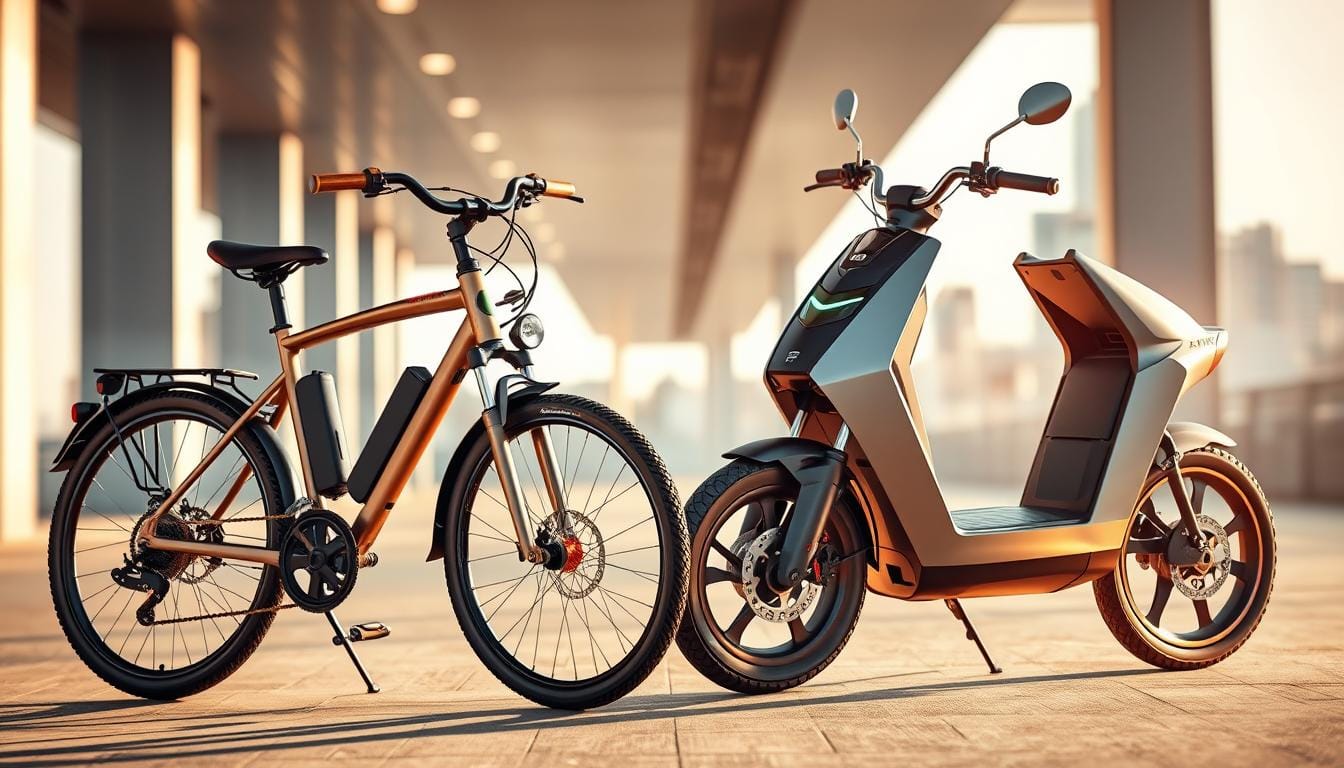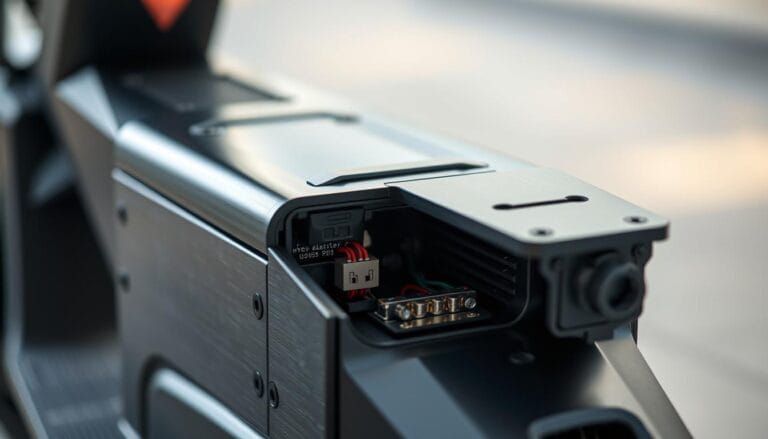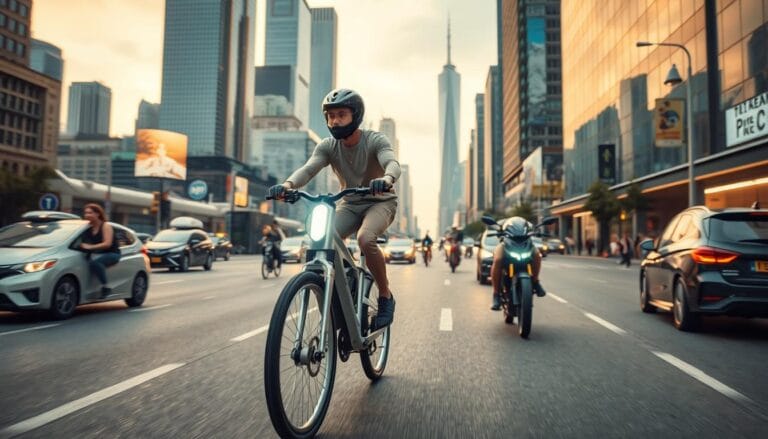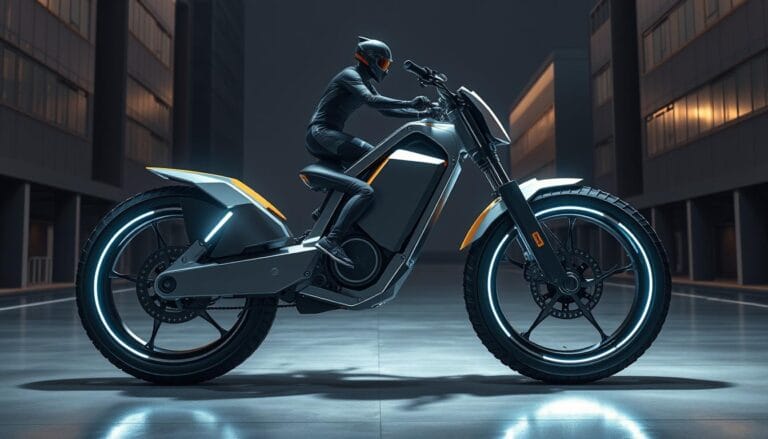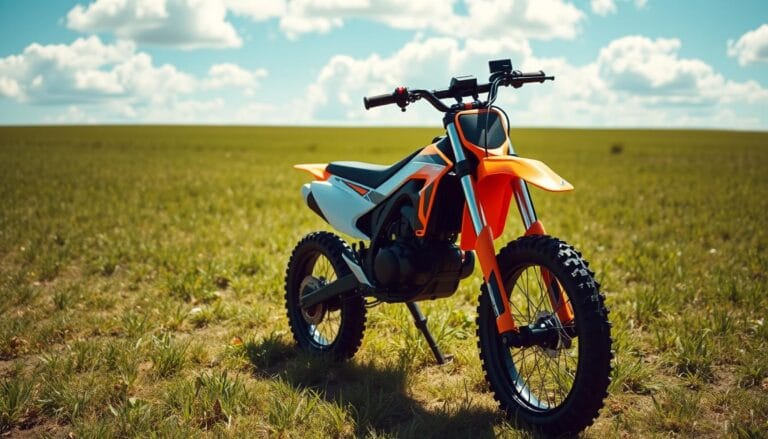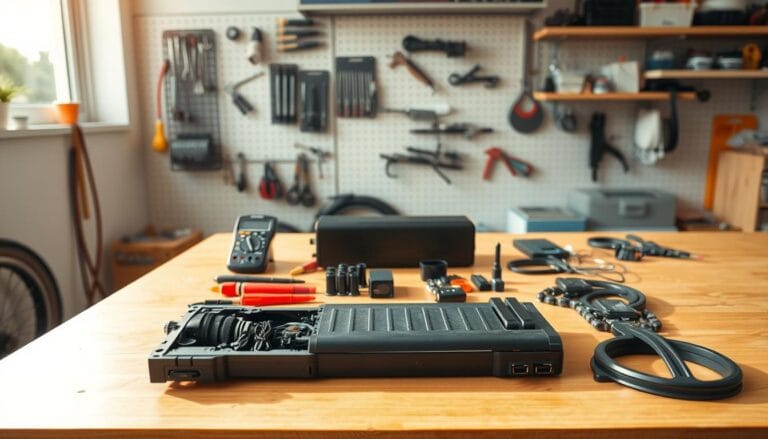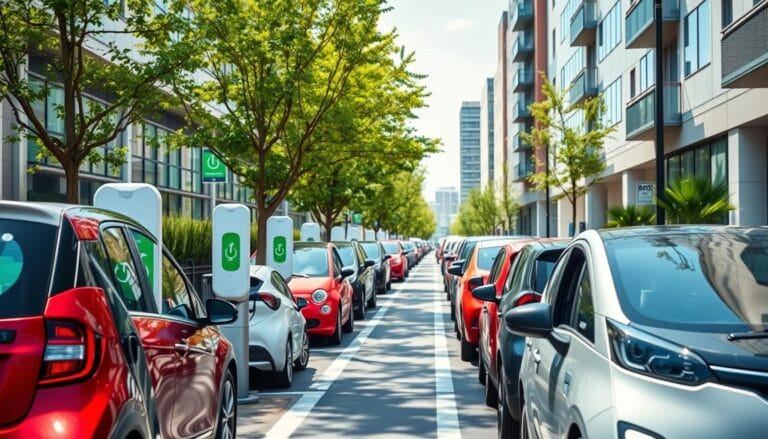E-Bike vs E-Scooter: Which Is Right for You in 2025?
Urban mobility is changing fast, and you’re at a key decision point. Electric bicycles and scooters are making city travel exciting and green. Every ride is now a chance to explore and enjoy the city in a new way.
Picture yourself moving smoothly through busy streets, choosing a ride that shows your style and care for the planet. Whether you prefer the ride of an electric bike or the quickness of a scooter, you’ll find your ideal city mate.
In 2025, these electric rides are more than just ways to get around. They offer speeds from 15 to 28 mph for bikes and 10 to 20 mph for scooters. You’ll find a mix of freedom, ease, and green travel.
Table of Contents
Understanding E-Bikes and E-Scooters
Modern urban transportation is changing with new battery-powered vehicles. Electric bikes and scooters are now popular choices for city travel. They are eco-friendly and efficient.
What Is an E-Bike?
An e-bike is like a regular bike but has an electric motor. This motor helps you pedal easier, making long rides less tiring. Typical e-bikes weigh between 40-75 lbs and can go up to 20-28 mph.
- Powered by rechargeable batteries
- Offers pedal-assist functionality
- Suitable for various terrains
- Provides fitness benefits
What Is an E-Scooter?
E-scooters are small, stand-up electric vehicles for quick city trips. Weighing between 20-70 lbs, they have small wheels for easy city navigation. They can go from 12.4 to 40 mph, perfect for short rides.
- Lightweight and portable
- Electric motor-powered
- Compact design
- Easy to maneuver
Key Differences in Design
E-bikes and e-scooters differ mainly in design and riding experience. E-bikes keep a traditional bike frame but add electric parts. E-scooters have a simple design for easy city travel.
| Feature | E-Bike | E-Scooter |
|---|---|---|
| Weight Range | 40-75 lbs | 20-70 lbs |
| Speed Range | 20-28 mph | 12.4-40 mph |
| Typical Range | 20-50 miles | 15-30 miles |
Benefits of Riding an E-Bike
Electric bicycles are more than just bikes. They offer a mix of transportation and personal freedom. They are great for commuters and fitness lovers alike, offering benefits that other ways of getting around can’t match.
Longer Range and Speed Capabilities
E-bikes can go 20 to 60 miles on one charge. They are much faster than regular bikes, reaching speeds of 15 to 28 mph. This makes them perfect for long rides and tough paths.
- Range: 20-60 miles per charge
- Average speed: 15-28 mph
- Suitable for varied urban and suburban environments
Health and Fitness Advantages
E-bikes are great for staying fit while getting a boost. You can adjust how much help you get from the bike. This makes them perfect for any fitness level and goal.
Impressive Cargo Capacity
E-bikes can carry a lot more than most bikes. They come with baskets, panniers, and rear racks. This lets you carry groceries, work stuff, or personal items easily.
- Integrated rack systems
- Flexible cargo attachment options
- Enhanced urban mobility
Advantages of Using an E-Scooter
Electric scooters have changed how we move around cities. They are small, efficient, and easy to use. These features make them a great choice for city living.
Portability and Convenience
Electric scooters are super easy to carry around. They weigh between 20-40 lbs, which is lighter than electric bikes. You can:
- Easily fold and carry on public transit
- Store in small apartments or office spaces
- Transport without special racks or vehicle modifications
Cost-Effectiveness
Electric scooters are also budget-friendly. Prices start at $300 and go up to $800. This makes them a good choice for those on a budget.
| E-Scooter Price Range | Typical Features |
|---|---|
| $300 – $800 | Basic models, suitable for short commutes |
| $800 – $1,500 | Advanced features, longer range, higher speed |
Ideal for Short Distances
Electric scooters are great for short trips in the city. They can go 10-30 miles on one charge. This makes them perfect for:
- Commuting to nearby workplaces
- Running quick errands
- Navigating congested city streets
They are easy to handle and small in size. This makes electric scooters a top choice for city travel.
Environmental Impact Comparison
Urban transportation is changing with new, green options. E-bikes and e-scooters are becoming popular for their eco-friendly nature. They cut down on carbon emissions in cities.
- Zero direct emissions during operation
- Minimal energy consumption
- Reduced carbon footprint compared to cars
E-Bikes and Sustainability
Electric bikes are a top choice for those who care about the planet. They use very little electricity and can replace car trips for longer distances. Many makers are using eco-friendly materials and processes.
E-Scooters and Carbon Footprint
Electric scooters are great for short trips around the city. They don’t produce emissions when in use. But, their shorter life can lead to electronic waste issues.
Energy Consumption Analysis
| Transportation Mode | Energy Consumption | Carbon Emissions |
|---|---|---|
| E-Bike | 20-50 miles per charge | Minimal |
| E-Scooter | 10-30 miles per charge | Very Low |
E-bikes and e-scooters help lower carbon emissions in cities. They are good choices for those who want to be green. Your decision depends on what you need, but both are big steps toward a greener commute.
Legal Regulations for E-Bikes
Understanding the laws around electric bicycles is key for safe rides. It’s important to know the rules for using e-bikes in cities.
Licensing and Insurance Requirements
Electric bikes fall into different categories based on their features. Most states group e-bikes into three main types:
- Class 1: Pedal-assist up to 20 mph
- Class 2: Throttle-assisted up to 20 mph
- Class 3: Pedal-assist up to 28 mph
Age Restrictions
The age you can ride an e-bike varies by place. Here are some common rules:
- Most places say you must be at least 16-18 years old
- Younger riders need a parent with them
- Some places require extra safety training
Helmet Laws
Wearing a helmet is crucial for safety on e-bikes. Many cities have strict rules:
| Age Group | Helmet Requirement | Potential Fine |
|---|---|---|
| Under 18 | Mandatory | $25-$100 |
| 18-21 | Recommended | No fine |
| Over 21 | Optional | No fine |
Always check local laws for e-bikes to stay safe and follow the rules.
Legal Considerations for E-Scooters
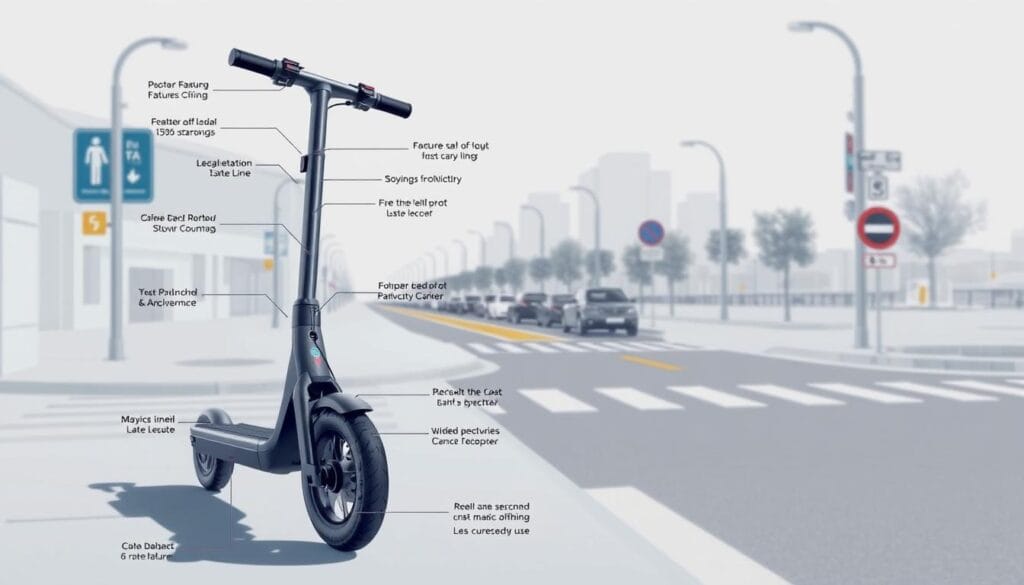
Understanding the laws for electric scooters can be tough. Rules for using e-scooters change a lot from city to city and state to state. It’s very important to know the local laws before you start riding.
Understanding Local Regulations
By mid-2024, 28 states and Washington, D.C. had updated their e-scooter laws. These updates cover important areas like:
- Age restrictions
- Speed limits
- Where you can ride
- Helmet rules
Riding in Different Areas
The rules for e-scooters can change a lot depending on where you are. For example:
- California says e-scooters can’t go faster than 15 mph
- In New York, kids under 18 must wear helmets
- Florida lets e-scooters on streets and bike paths
- Virginia says e-scooters can go on sidewalks and paths shared with bikes
Scooter-Specific Rules
There are federal rules for electric scooters. They say:
- E-scooters can’t go faster than 20 mph
- The motor can’t be more than 750W
- Only one person can ride at a time
- You can ride on roads up to 35 mph, bike paths, and bike lanes
“Knowing the local e-scooter laws is key. It’s not just about following the rules. It’s also about staying safe and keeping others safe.”
Always check the local laws before you ride an electric scooter. This way, you can have a safe and legal ride in the city.
Cost Analysis: E-Bikes vs E-Scooters
When looking at commuting options, e-bikes and e-scooters have different costs. Knowing the total cost helps you choose between these two popular choices.
Initial Purchase Price
The cost to start varies a lot between e-bikes and e-scooters. Electric scooters are usually cheaper:
- E-Scooters: $200 – $1,500
- E-Bikes: $500 – $5,000
Maintenance Costs
Long-term costs are different for these vehicles. E-bikes need more upkeep:
| Maintenance Aspect | E-Scooters | E-Bikes |
|---|---|---|
| Annual Maintenance Cost | $50 – $200 | $100 – $500 |
| Battery Replacement | $300 – $800 | $500 – $1,000 |
| Typical Repair Frequency | Low | Moderate |
Insurance and Registration
Costs also include insurance and registration. E-bikes usually have lower costs for these compared to e-scooters. Costs can vary by where you live.
- E-Scooter insurance: Often optional
- E-Bike registration: Typically minimal or free
- Local regulations may impact additional costs
Tip: Always check your local regulations for specific insurance and registration requirements for battery-powered vehicles.
Choosing between an e-bike and e-scooter depends on many factors. You need to consider the initial cost, maintenance, and long-term value. Your commuting needs will help you decide what’s best for you.
Comfort and Riding Experience
When looking at urban transportation, comfort is key. Electric bicycles and scooters offer different experiences. Your choice affects your daily commute or fun rides.
Comfort Level on E-Bikes
Electric bicycles are more comfortable for city rides. They have big wheels and a seat. This gives you:
- Ergonomic seating with adjustable positioning
- Better shock absorption on uneven surfaces
- Stability during longer rides
They go 15 to 28 mph and last 30-60 miles on one charge. You can pedal or use the electric boost. This makes them great for all kinds of rides.
Comfort Level on E-Scooters
Electric scooters offer a unique ride. They are small and light. This means:
- Lightweight and portable
- Quick maneuverability in tight urban spaces
- Standing position allows for quick starts and stops
They go 10-20 mph and last 10-25 miles. But, their small wheels can make rough rides uncomfortable.
Weather Considerations
Weather affects how comfortable you are. Electric bikes are better in many weather conditions. E-scooters might be harder in wind, rain, or rough terrain.
Choose your urban transportation based on your specific comfort needs and local riding conditions.
Choosing the Right Mode for Commuting
Choosing the right way to get to work can change your day. E-bikes and e-scooters are great for different needs. Knowing what you need helps pick the best way to travel in the city.
Daily Commute Distance
How far you need to go affects your choice between an e-bike and e-scooter. Think about these points:
- E-bikes are great for longer rides: Can go 20-60 miles on one charge
- E-scooters are best for short trips: Usually go 10-30 miles
Traffic Conditions
How you move through the city differs with e-bikes and e-scooters:
| Vehicle | Speed | Maneuverability |
|---|---|---|
| E-Bike | Up to 28 mph | Excellent on varied terrain |
| E-Scooter | 15-20 mph | Best on smooth urban surfaces |
Parking Options
Think about where you’ll park your ride:
- E-scooters are easy to store: Fold up to fit in a briefcase
- E-bikes take up more space but have good locks
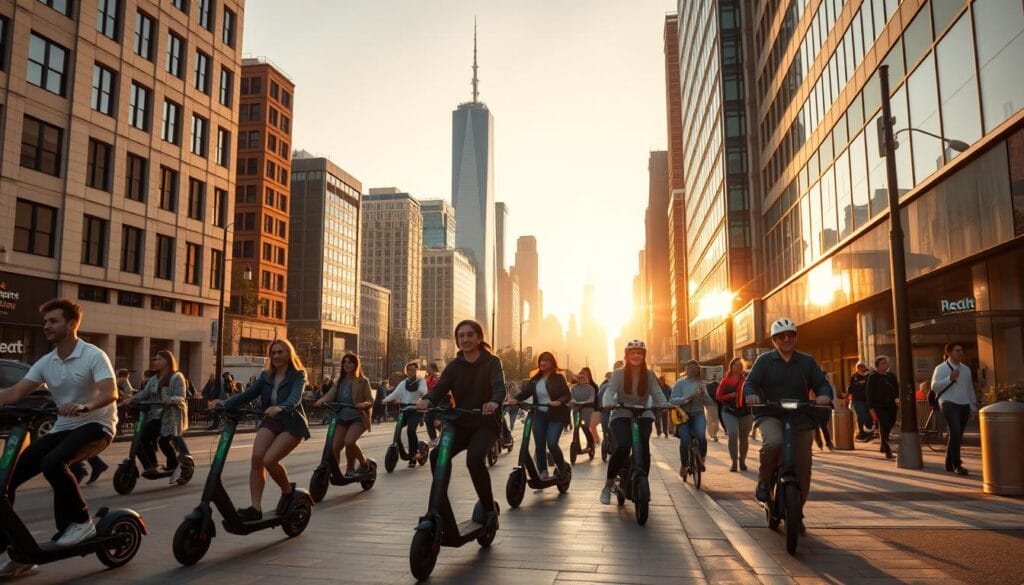
Your choice depends on your commute, budget, and the city’s setup. Look at your needs to find the best micro-mobility option.
Safety Features and Best Practices
Using battery-powered vehicles like E-Bikes and E-Scooters in cities needs knowing about safety and how to stay safe. It doesn’t matter if you pick an E-Bike or an E-Scooter; your safety is key.
E-Bike Safety Features
E-bikes have special safety features to keep riders safe. These include:
- Integrated lighting systems
- Reflective frame elements
- Disc brakes for precise stopping
- Stable frame design
E-Scooter Safety Measures
E-scooters need extra safety steps to keep riders safe in cities. Riders should:
- Wear protective gear
- Add extra lighting
- Use reflective clothing
- Keep visible
Riding Safety Tips
To stay safe on battery-powered vehicles, follow these tips:
- Always wear a helmet
- Follow local traffic rules
- Be aware of traffic around you
- Keep your vehicle in good shape
- Check the battery before you ride
Safety is not an option—it’s a necessity when riding urban transportation vehicles.
Knowing about battery safety is very important. Lithium-ion batteries need careful handling to avoid fire risks. Always use the charger the maker says is okay. Don’t charge it when you’re not there. Watch for signs like unusual colors, smoke, or smells that seem like burning.
Maintenance Needs for E-Bikes and E-Scooters
It’s important to keep your battery-powered vehicles in good shape. Electric bicycles and electric scooters need different care. Each has its own challenges and needs.
E-Bike Maintenance Checklist
Electric bicycles need regular checks to ride smoothly and safely:
- Regularly inspect and lubricate the chain
- Check tire pressure and tread wear
- Examine brake pad condition
- Clean and maintain battery connections
- Verify electrical system integrity
E-Scooter Maintenance Tips
Electric scooters need special care because of their small size:
- Monitor tire pressure weekly
- Check folding mechanism for smooth operation
- Inspect battery health and charging performance
- Clean and tighten electrical connections
- Examine brake system regularly
Common Repairs and Issues
Both electric bicycles and electric scooters face wear and tear. Proactive maintenance helps prevent costly repairs. Common issues include:
- Battery degradation over time
- Tire wear and punctures
- Electrical system malfunctions
- Brake pad replacement
- Frame and structural integrity checks
Regular maintenance can make your battery-powered vehicles last longer. It ensures they work well for many years.
Future Trends and Innovations
The world of urban transport is changing fast, with e-bikes and e-scooters leading the way. By 2025, big tech leaps will change city travel. New battery tech and smart links will make rides better and more fun.
E-bike tech is growing fast. New motors are stronger and lighter, and batteries last longer. The e-bike market could hit $38.5 billion by 2025, thanks to cool tech like IoT. Soon, e-bikes will have better maps, track your ride, and connect with your phone easily.
E-scooter design is also getting a boost. They’re now lighter and foldable for city travel. Fast charging and safety features like collision alerts are coming. The scooter market could reach $50.78 billion by 2032, showing their big potential.
Advancements in E-Bike Technology
Electric bikes are getting smarter for city life. Look for better batteries and smart city links. Your e-bike will soon be a smart travel buddy.
Innovations in E-Scooter Design
E-scooters are changing city travel with new designs. They’re now made with green materials and better recycling. Expect smart scooters with traffic info, IoT, and safety features for easy, green travel.

